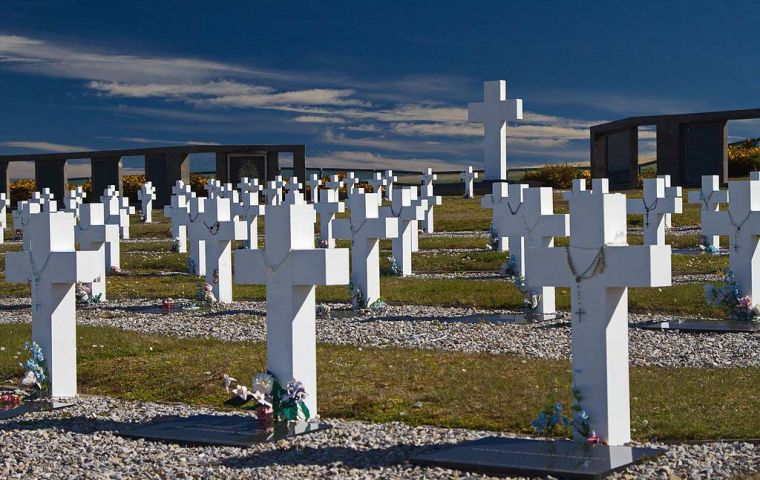MercoPress. South Atlantic News Agency
Falklands/Malvinas: Red Cross presents final report after six Argentine soldiers are identified
 The Argentine military cemetery at Darwin where remains of 115 soldiers were identified
The Argentine military cemetery at Darwin where remains of 115 soldiers were identified  “Every family deserves to know what happened to their loved one,” said Gilles Carbonnier, Vice President of the ICRC.
“Every family deserves to know what happened to their loved one,” said Gilles Carbonnier, Vice President of the ICRC. The International Committee of the Red Cross presented on Monday, in Geneva, its final report on forensic work to identify the remains of Argentine soldiers in the Falkland/Malvinas Islands.
In this second phase of the Humanitarian Project Plan (HPP2), the ICRC identified the remains of six Argentine soldiers buried on the Islands, providing closure to their families after 38 years of uncertainty. The report was presented to the diplomatic missions of Argentina and the United Kingdom in Geneva.
HPP 2 involved the exhumation of human remains located within one grave known as C.1.10 in the Argentine military cemetery at Darwin. The ICRC team excavated this grave and found the remains of the six individuals. Samples were analyzed by the Forensic Genetic Laboratory of the Argentine Forensic Anthropology Team (EAAF) for identification, which successfully provided a positive ID for all six individuals. Their families were notified, and the remains have now been reburied according to the wishes of each family.
The ICRC team also assessed an area called Teal Inlet (Caleta Trullo) to investigate whether there were human remains of Argentine soldiers, but nothing was found.
“Every family deserves to know what happened to their loved one. As part of our humanitarian mandate, we were glad to support this process and bring so many years of uncertainty to an end,” says Gilles Carbonnier, Vice President of the ICRC.
“Today, we present our findings to Argentina and the United Kingdom as we close a project that was made possible as both governments respected and actively supported ICRC's role as a neutral and impartial humanitarian organization.”
The results were presented to delegations from Argentina and the United Kingdom at the ICRC's headquarters in Geneva, during a meeting chaired by Gilles Carbonnier. The delegations were led by Ambassador Federico Villegas from Argentina and Ambassador Simon Manley from the United Kingdom.
This project followed on from the First Humanitarian Project Plan (HPP 1), which led to the exhumation of the remains of 122 Argentine soldiers in the Argentine military cemetery at Darwin. Following DNA sample testing with the families, 115 soldiers were identified. The HPP 1 was the first such project with a specific joint mandate from two States, Argentina and the UK, that had been on opposite sides in an armed conflict.
Projects such as HPP 1 and HPP 2 find their mandate in the Geneva Conventions, and are examples of the ICRC working towards its objective on preventing and resolving cases of people going missing in armed conflict.




Top Comments
Disclaimer & comment rulesCommenting for this story is now closed.
If you have a Facebook account, become a fan and comment on our Facebook Page!